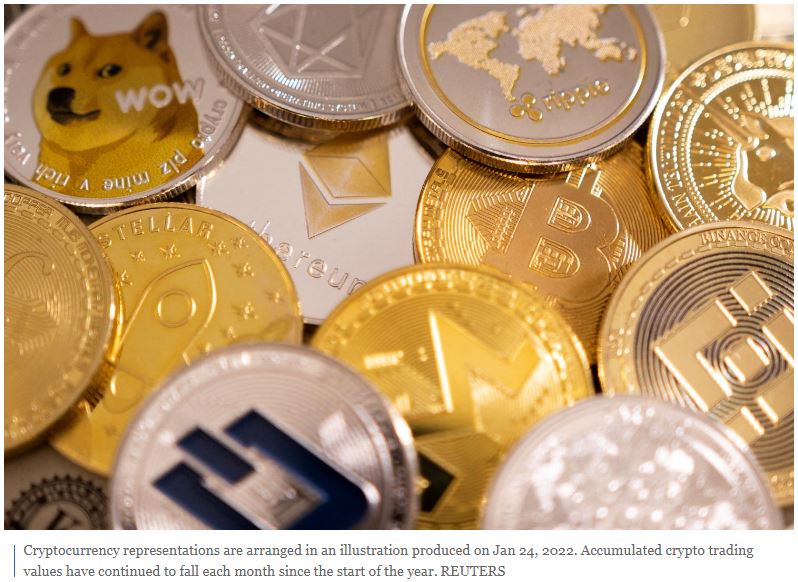Thailand: Crypto buyers pummelled amid global crisis
The number of Thai cryptocurrency trading accounts has fallen by 67% since January, according to the Securities and Exchange Commission (SEC).
The sharp decline in active trading accounts, from 707,000 last December to 230,000 on July 25, stemmed from poor market sentiment resulting from macroeconomic policies, including interest rate increases, quantitative tightening, and economic slowdown. In addition, several cryptocurrency lending platforms have filed for bankruptcy.
Furthermore, accumulated crypto trading values have continued to fall each month since the start of the year.
The SEC’s statistics show that the monthly crypto trading value in Thailand has continued to decline in line with the drop in the number of trading accounts, from total trading of 180 billion baht in January to around 54 billion baht on July 25. More than 50% of investors are individuals.
The top five most popular crypto coins in the Thai market in terms of accumulated trading valuation from January to July 25, 2022, were: Tether with 113.3 billion baht, or 15.1%; Bitcoin with 89 billion baht, or 11.9%; Ethereum with 59.8 billion baht, or 8.01%; Gala with 47.8 billion baht, or 6.41%; and KUB with 43.5 billion baht, or 5.83%.
CAUSES OF THE DECLINE
Peeradej Tanruangporn, chief executive of digital asset exchange Upbit Thailand and president of the Thai Digital Asset Operators Trade Association, explained that the main reason for the trading decline in cryptocurrencies and the falling number of active trading accounts was the value of cryptocurrencies.
Prices of cryptocurrencies are falling globally, such as Bitcoin, which has dropped from its peak of 1.8 million baht at the beginning of the year to around 600,000 to 700,000 baht at present.
Second, Mr Peeradej said that the global economy has slowed down due to the Russia-Ukraine war, inflation, and lockdowns in China. These have been key drivers leading to falling supply, resulting in stagflation and hyperinflation alongside higher interest rates.
These are the pressures that have drained liquidity from the world market. As a result, the stock market and the crypto market have been volatile, continued to decline, and are entering into “bear market” territory.
However, the latest US economic data has improved, as indicated by the rising employment rate, despite the contracting GDP. The Federal Reserve also recently raised interest rates by 0.75%, which was considered to be below analysts’ expectations of 1%. This prompted investors to return to buying crypto in the short-term, leading Bitcoin prices to surge to around $23,000, from $20,000 in the previous month.
ZIPMEX FIASCO
Thailand’s leading digital asset exchange Zipmex is still in hot water as the platform is prohibiting investors from withdrawing their assets that are tied up in the Zwallet with investments related to ZipUp+.
The platform later explained that the issues stemmed from a financial product called ZipUp+ which was linked to crypto lenders Babel Finance and Celsius.
According to Zipmex Thailand, there are about 60,000 to 70,000 Thai investors with total assets of about 2 billion baht that cannot withdraw from the ZipUp+ product that was in Zwallet.
Zipmex Asia, the parent company of Zipmex, explained that the moratorium relief process does not allow investors to withdraw assets for now. However, Zipmex said it was trying to solve the problem and some coins will be completely paid back to investors, such as SOL, ADA and XRP.
“The Zipmex case has caused some investors to lose their confidence in crypto trading. This makes some investors stop investing in crypto,” said Mr Peeradej.
He added that the SEC inspected all the remaining local digital asset exchanges to check whether their properties and assets are deposited elsewhere. All seemed fine and are operating as usual without any issues.
Thanakorn Reanrungreung, an investor who was affected by the Zipmex incident, said the events had left a bad taste in his mouth, and he believes he may not be able to recover any money.
“After this, I will stop investing in crypto for a while; I have already withdrawn all investments in other crypto exchanges such as Binance and Bitkub,” Mr Thanakorn said.
BEAR MARKET
As for the crypto crisis that is taking place in the country, there is a problem with Zipmex that needs to be addressed. Others have little impact because they do not function as a coin depositor.
Nonetheless, the major cause of the overall decline in crypto confidence comes from outside of Thailand. Zipmex is another concern for short-term market sentiment, Mr Peeradej said.
Palakorn Yodchomyan, co-founder and chief executive of digital asset platform KULAP, said cryptocurrency is currently in a bear market due to the impact of the economic downturn and the use of interest rate hikes to solve inflationary problems, together with the collapse of some large crypto lender platforms such as UST Terra, Three Arrow Capital (3AC) and Celsius Network, which has led to the loss of some liquidity.
In the case of Zipmex, approximately 2 billion baht of investors’ money is stuck in the platform and cannot be withdrawn, causing a chunk of the market’s liquidity to disappear.
RECOVERY PROCESS
Mr Palakorn said that a bear market in a crypto cycle usually takes approximately one and a half years to recover.
Currently, with the bear market status, the Bitcoin price has dropped by around 60% from its peak to currently stand at $22,888/BTC (as of Aug 3 at 12.10pm on coingecko.com).
As for Bitcoin’s recovery, it is expected to happen after the next round of “Bitcoin Halving”, which is forecast for 2024.
Source: https://www.bangkokpost.com/business/2360967/crypto-buyers-pummelled-amid-global-crisis


 English
English




